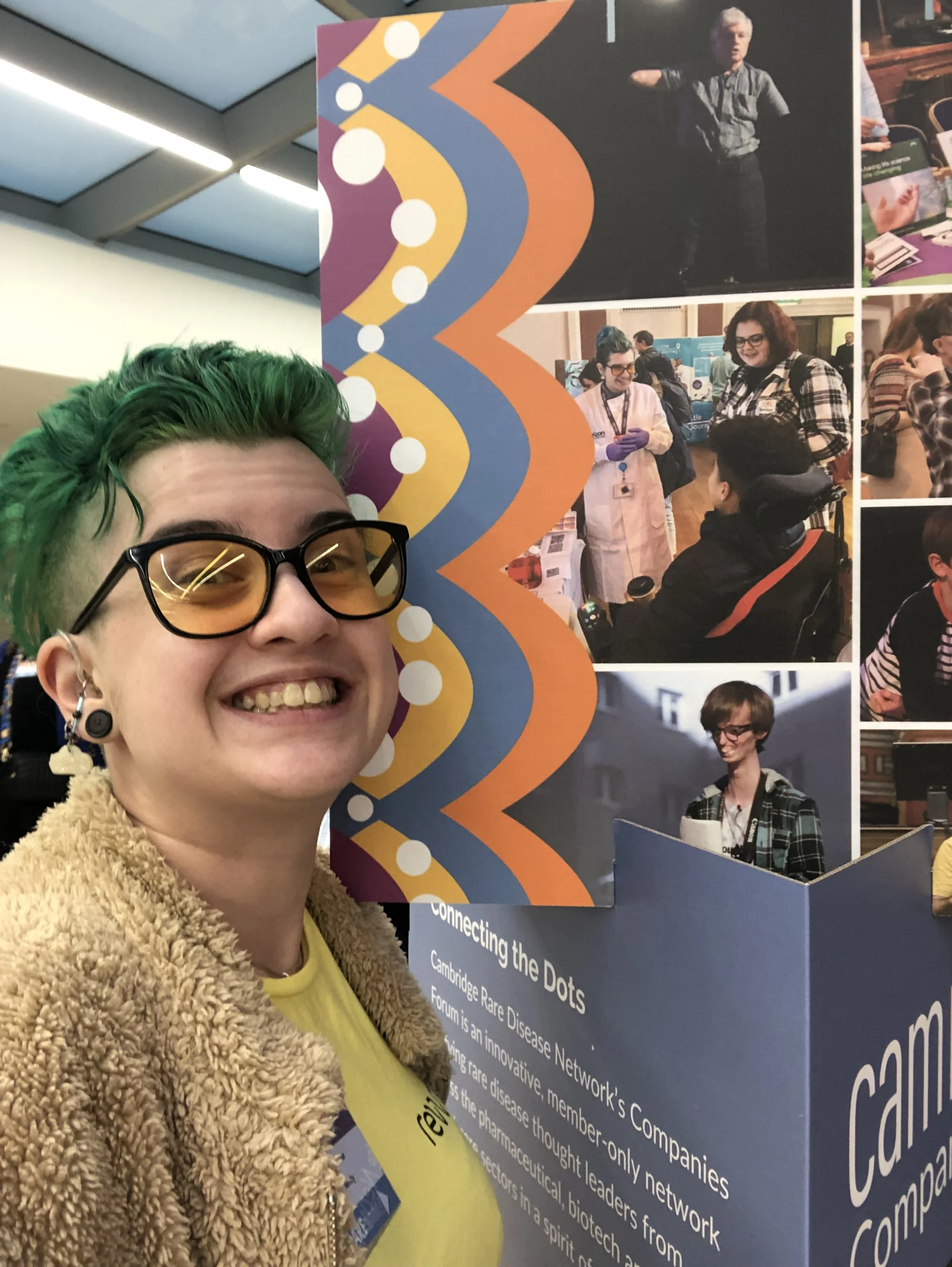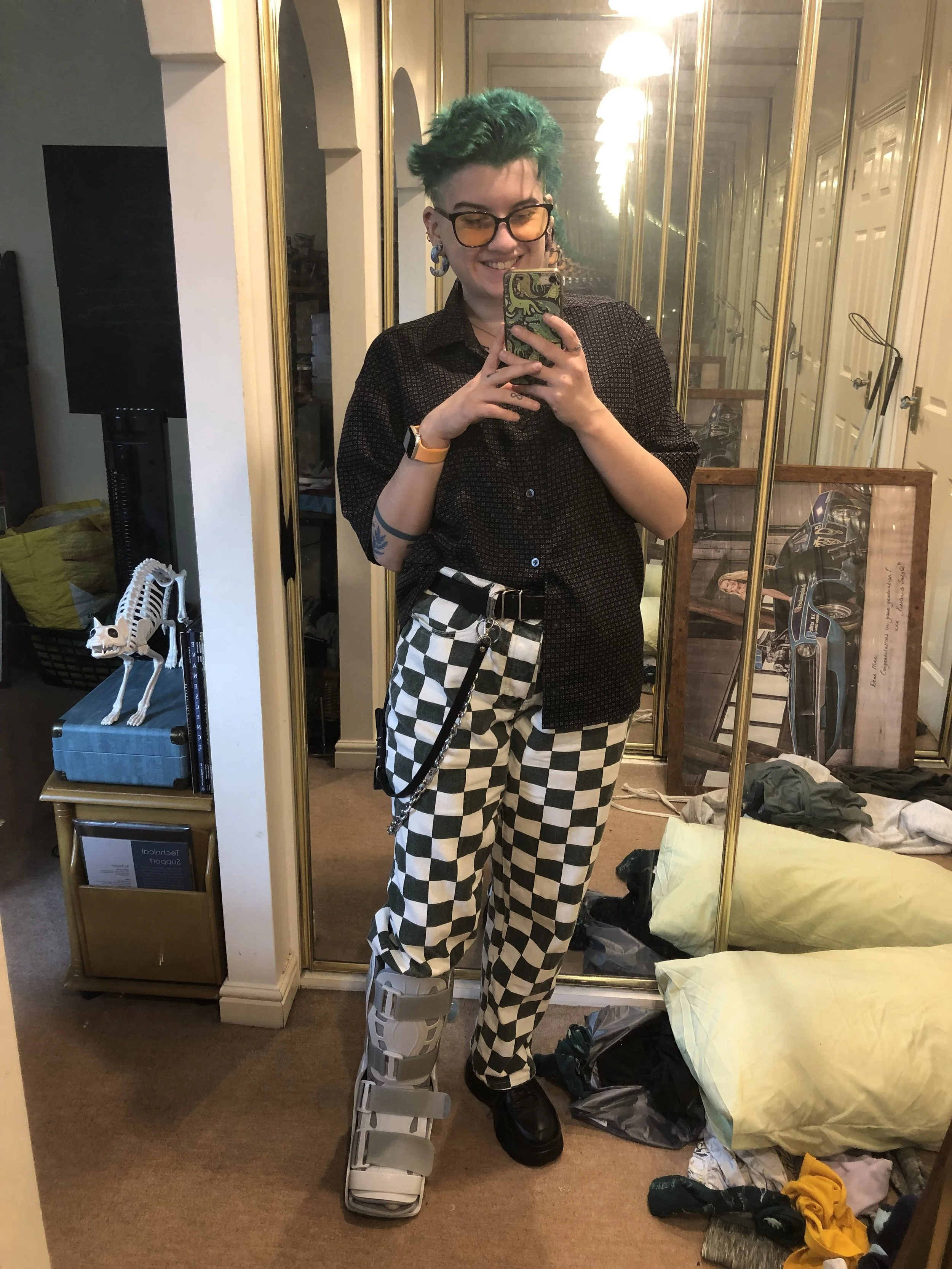Max Fisher
[Image Description]: Max rocks bright green hair, orange glasses, a tweed blazer, and chunky black earrings. They smile as they proudly show off a star shaped award from the organization “Sense”.
[Image Description]: Max smiles enthusiastically beside an exhibit titled “Connecting the Dots” from the Cambridge Rare Disease Network’s Company Forum. They have bright green hair, glasses with orange lenses, and multiple earrings.
[Image Description]: Max smiles in a mirror selfie wearing a walking cast on their foot, white and black checkered pants, and a black blouse.
Meet Max (they/them), a DeafBlind, cell line engineer, and the loudest Disabled person in the world. Max Fisher, Disabled. With a capital D. Underline it and bold it if you will.
Tell us about your STEM? What do you do, what do you love about it, what brought you to the field?
I started with an undergrad and then a master's degree in pharmacology. I worked on Toll-Like Receptor 8 in THP-1 cells, a receptor makes you more susceptible to certain viruses. We picked our projects from a list based on what interested you, and who you liked working with. I liked the idea of working on asthma and respiratory viruses because I was always coming down with colds. That's just always been part of my existence. I thought it sounded like a really interesting project.
My thesis is what started a bit of a love affair with THP-1 cells. I even have a tattoo that says THP-1. It may seem a little dark, because it’s a blood cancer cell line. They’re hard to culture because they don't really like being alive that much. I once cultured a billion of them, and it was the best day of my entire life.
That’s also what got me my current job. Some of my friends from university recommended that I interview with this company. I’d been unemployed for three and a half years, because I’m Disabled, Trans, Queer- all the words that make me cool, but tend to give employers a panic attack, ‘oh, you’re not a good fit for the company’. But three people talked me up from the inside of this company, and the fact that I love THP-1 cells got me in.
At my current company: other researchers tell us they want to work with a certain cell line. Maybe they want to see what a certain gene does, or how it would affect how a cell responds to a drug. We can knock a gene out for them, or we can knock something in. They can then use those cells for disease research or for drug testing. I'm at the end of that pipeline. The team will transfect a group of cells and try to separate them into single cell populations. I'll then grow them from a single cell to up to 10 million cells, and make sure that we have what we think we have so that when we send it to the client, it's actually what they want.
It’s lots of microscope work, and a lot of robot work. Luckily, microscopes and robots are my jam.
What accommodations allow you to thrive? Tips, tricks, hacks that work for you?
It's a lot of just winging it. And being very fortunate that a lot of things that I needed were already in place, even though I’m the first DeafBlind employee of my company. The microscopes are all quite fancy, with different filters and dials to adjust the light levels and contrast. The ones I learned on were just light bulbs! Once I figured out all the buttons, I realized I could really make it work for me.
I'm also very loudly Disabled, so that if I have a problem, I don’t explain myself, I just say “I can’t see it, fix it.” or “Somebody read it”.
I don’t have a desktop screen reader because I’m also Deaf, so instead I use magnifiers for reading screens, which is very helpful when looking at scans. My visual impairment is called visual snow syndrome, so I see TV static everywhere. My visual acuity isn’t terrible, I can see objectively quite a lot, but what I do see is all dancing and staticy and fuzzy, like a poorly tuned TV. Weirdly I think it actually makes me better at my microscopy, looking for tiny cells that are only specks on the screen. Sometimes you can’t see it anyway without zooming in.
Anything to add to our accommodations wish list?
I'd say captions, for all texts, and alt text. Anything that's embedded in an email has to have open captions. Because if you embed something in an email, it takes off all of the settings. Also, even just awareness that people need captions. Not everybody has English as a first language. Not everybody is fluent in it. Not everybody can hear. And then, some people just like captions!
When it comes to presentation slides, or web design - avoid too much contrast, but obviously there has to be enough contrast to read it. I can't read night mode, but I can read black text on a white background. That’s still quite high contrast, but it’s not as jarring for my eyes and my brain. Super bright colours can look good, but they can also be pretty illegible.
Also awareness that someone may not want to tell you their disabilities. Just be a nice human being. If someone says they can’t do something, don’t ask them why. Instead ask how you can help, or if there’s something else they could do instead.
What do you want people to know about being Disabled in STEM?
We can do it. Disability is like definitely not what you think it is. Sometimes at work, when I refer to myself as Disabled, people tell me ‘no, stop! You’ve got super powers’, or ‘you're just differently abled.’ What do you think Disabled means? I guarantee it doesn’t mean that. It’s just a way of describing bodies that perhaps function a little differently. And I’m very proudly Disabled, but not everyone sees it like that. So just open your mind a little.
What advice would you give to someone Disabled starting their STEM journey?
You can do it, it just might take some time. When I was at university, I was told that if I had a degree I would walk straight into a job. I never did, because that sentence did not apply to people like me. So you might not walk straight into a job. But that doesn’t mean you won’t walk (or wheel) into a job. But you will get there eventually, even if it takes a bit of work on your end. I didn’t give up, and now I am the coolest person where I work. I do my job, and I do my job very well. I do extra stuff too. I’m involved in social things, and charities. I’m now a global leader in disability for our company, and I’ve been in this position for a year. In October I went to a rare disease conference to talk about coming through the other side of being a young person with a rare disease, and now thriving as a Disabled person in STEM.
It’s totally worth it. You will bring so much more to the role than anybody else, because you adapt to things in your life every single day. There’s not a day I don’t encounter a problem related to a disability, or maybe I’ll spot something that will impact someone else’s disabilities. Working around those things doesn’t stop my day. I’m so used to troubleshooting and problem solving that I can just do it. Now, if there’s a problem at work, I’m often the one they come to, because I will have a solution.
Also, keep all of your university friends close, because I wouldn't be here without mine. If workplaces have preconceived ideas about what disability is, then it’s much harder to get a foot in the door. Whereas if you have someone on the inside, they can say, ‘my friend is looking for a job, they’re really good’. And then later, it might come up that you’re Disabled, but then it’s ‘okay, cool’. During my interview, I just didn’t mention my disability. I mentioned my hearing aids, but only because the battery died halfway through (I did try to replace them right before, but I think I was so nervous that I took out the bad batteries, and then put the same ones back in!). I don’t want to hide my disability, and I wish I hadn’t, but I still got the job. That’s when I brought it up. By the way, I'm Disabled.
Anything else to share about your story?
My company is starting up a brand new employee resource group, which I’ve been chosen to lead, and a great team that make it a wonderful group for all of our employees- Disabled or not. This is great and awesome. This is something that I’ve pushed for. I was on their radar for the position, because during my first week or two with the company I sent out an email for Deaf awareness week, sharing some facts about deafness and how to communicate with me. I sent that to everyone, including our head of HR. So I was known because I was doing activism and Disability projects. When the resource group was proposed, I was the first name that came up. They asked if I wanted to get involved. Hell yes, you’re stuck with me!
I have so many big plans. I want to work on our training videos - they’ve got to be captioned. There’s hundreds of them too, because we’ve got a lot of departments and do a lot of different things. Some of them are important stuff: aseptic technique, how to deal with contamination, fire safety, the normal lab stuff. Lots of this is filmed in the lab, or in microbiological safety cabinets, which sound like vacuum cleaners when there’s six lined up in a room. And if you’re trying to talk over that, the camera doesn’t always pick it up, and you might not be able to hear it. Even if you’re not Deaf, you might struggle to understand what’s going on.
I want to get into alt text training, because it’s becoming more popular. It’s even now available on Linkedin. But few posts have alt text on them - partly I think, because of lack of awareness. I want to put together some corporate guidelines for designing logos, colour schemes, all the official important stuff. I have issues with contrast - if I look at something with high contrast for more than a half second, it’s imprinted in my retina. So providing options for our slides is important to me.
People might think I'm loud about Disability and about being a capital G Gay. But I’m so many other things, just a bit quieter about those because they don’t impact my daily life. I’m a druid too, not the fantasy kind, but the real kind. We're really interesting people, because we’re about kindness, peace and justice. I’m also a big book worm, even if it does take me longer to get through them than others.
Regarding the argument we always hear against Disabled people in STEM: ‘but you couldn’t have a Blind neurosurgeon!’
That’s one of my favourites. Because what do they mean by ‘Blind’? If they mean totally blind, then potentially neurosurgeon, not the best career - but that doesn't mean that you can't be involved in STEM. Especially now with the emergence of Artificial Intelligence, and lab automation. So much now is done with computers and cameras, that Disabled people are able to do so much more now more than ever.


